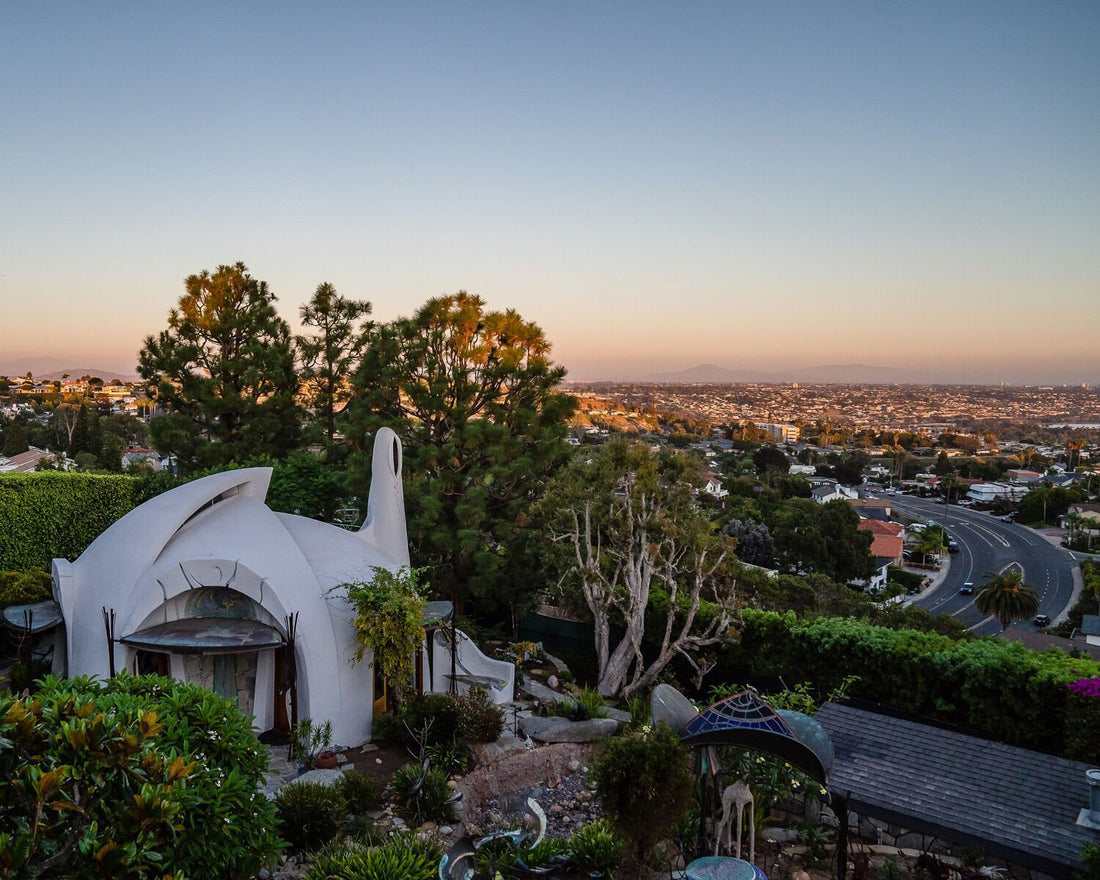An exiled Russian sculptor finds a home through a La Jolla art fanatic
What does Vladimir Putin have to do with a giraffe in La Jolla? Well, in a way it’s the Russian autocrat’s fault the animal recently showed up here in the back of a pickup truck from Oregon.
“I was a bit nervous about how it would fit,” artist Anton Yakushev says while wrestling the 300-pound metal giraffe—named Winnie—into Cathy Conheim’s hilltop house, a sanctuary filled to the brim with sculptures and paintings and boasting a James Hubbell “hobbit” house in the back yard.
“We were nervous too,” Conheim, 78, says, wearing a giraffe sweatshirt for the occasion. “Doing a long-distance, 8-foot giraffe is a challenge.” With Winnie wrapped in plastic, standing tall in the back of a Tundra, Yakushev, 37, had just traveled two days from Bend, Oregon, where for weeks he had been working with 2,000-degree flames heating, bending, and cutting steel to shape the sculpture.
“I’m a political artist,” he says, looking like a quintessential metal worker in boots and a black t-shirt, his arms tattooed with blacksmithing tools, hands like human bear paws. “This is my first giraffe. I spent two weeks on just a small two-foot model.”

Despite the difficulties of transporting the hefty, hoofed mammal across state lines, Winnie landed safely in her new home. Yakushev, however, hasn’t seen home in more than a year, thanks to Putin. Like millions of others, the war in Ukraine has turned Yakushev’s life upside down, trapping him in the United States and keeping him away from his 10-year-old son, who remains in Russia.
And it was all a matter of timing.
Last winter, Yakushev was invited by the Central Oregon Metal Arts Guild (COMAG) to teach blacksmithing along the West Coast. He and his second wife, Yekaterina, landed in Seattle on Feb. 15, 2022. On Feb. 24, Russia invaded Ukraine. Yakushev, whose mother is Ukrainian and who’s known for his outspoken political leanings, wouldn’t be safe returning home. They were stuck.
“In 2016, Anton had refused to do a map that included Crimea as part of Russia,” Yekaterina explains. “The project was organized by the most prestigious blacksmith association in Russia. They kicked him out.”
“Today he’d be imprisoned or killed,” Conheim adds.
“We only packed for two months,” the couple says. ”We never imagined we’d be here this amount of time.”

And the difficulties were just beginning. A Ukrainian attorney the couple hired in Oregon to help with their asylum case abruptly quit, claiming a conflict of interest and taking more than $20,000 in the process. “They couldn’t open a bank account; they couldn’t do anything,” Conheim says.
Luckily, Yakushev found a fan in Conheim. The art collector (a therapist by day) has taken the artist under her wing, helping with the couple’s asylum cases and generally looking after them. Winnie is kind of a thank you.
“Anton is extraordinary in metal arts,” Conheim says. “You can’t imagine a blacksmith can make sculpture look like that.” Yakushev forms soft shapes from hardened metal. His work contains few angles or sharp edges. One might be forgiven for thinking some of his figures are cast from clay or wax, but no. They’re hand-forged steel, fired and bent to look molded, supple.
“His attention to detail is so meticulous. He’s typically building small scale sculptures and the way he can capture an expression on a face in such vivid detail is just astounding,” says Hunter Dahlberg, a blacksmith and active member of COMAG. “We all go, ‘How the hell did he make that hand? It looks so real. And it’s the size of a pea!’”

Take, for example, the figures in his work Leaves Cover the War, a decidedly anti-war series that pre-dates his statelessness by some 10 years. Leaves Cover the War depicts skeletal, haunting soldiers laden with weapons who appear to be trudging through hardship, forced to carry their burdens—helmets, guns, bayonets, gas masks—even after death.
Yakushev and his brother scoured historic Russian battlegrounds for remnants, finding decaying steel helmets and old weapons to repurpose. Much of the metal behind Leaves Cover the War comes from a WWII-era ship the brothers found rusting near Moscow.
These days Yakushev and his wife live in a tiny house Conheim set them up with in Oregon. Yakushev has access to a forge and has collected a handful of awards recently while the couple awaits asylum hearings, which could be months or years away. More than 1.5 million asylum applications are pending in American immigration courts.
Conheim hopes Yakushev’s talents will help their case. “Winnie is extraordinary,” Conheim says after the sculpture is placed just so in the entryway. “Better than I even thought. She’s our greeter.”
source: San Diego Magazine
